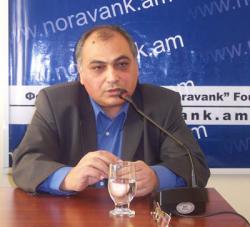NORAVANK READINGS RUBEN SAFRASTYAN: “ONE OF THE BEST RESPONSES TO GLOBALIZATION IS THE VERY CONSERVATIVE IDEOLOGY”
 On October 24 in “Noravank” Foundation was delivered a lecture on the subject “Armenian conservatism in the context of international conservative thought” (lectured by the director of the Institute of Oriental Studies, RA National Academy of Science, the candidate of historical science Ruben Safrastyan) in accordance with the “Noaravank” educational program on “Armenia and the Armenians in global developments: the present situation and challenges.”
On October 24 in “Noravank” Foundation was delivered a lecture on the subject “Armenian conservatism in the context of international conservative thought” (lectured by the director of the Institute of Oriental Studies, RA National Academy of Science, the candidate of historical science Ruben Safrastyan) in accordance with the “Noaravank” educational program on “Armenia and the Armenians in global developments: the present situation and challenges.”
Conservatism was given birth under certain historical conditions as a counteraction to modernization processes in the countries of Western Europe. Under quick and drastic changes in different spheres of life, the aspiration of the human being to keep the essence of things unchanged made a ground for certain strata of society to create a kind of ideological system. At first it appeared on the basis of rejecting the new and restoring the old. In that period conservatism was identified with keeping to traditions. However, when the progress proved to be unhampered, the tendencies of getting adopted and looking for a solid footing in the changeable world were put into action, thus giving birth to classical conservatism. In general, to up to date conservatism are characteristic not declinator or time-serving approaches to the changes occurring in the society, but the aspiration to adjust them in accordance with the situation.
According to R. Safrastyan, in this very context in mid 1990s the ideologies connected with the processes in Armenia did not coincide with the present situation of the Republic. In that period freedom (liberalism) was presented as the main ideology of building independent statehood. Basing on his personal experience the speaker made it precise why he proffered the conservative ideology.
In our days such a mentality is based on two tenets: a) belief in God and his ten tablets, b) specificity of views, distrust to abstractions c) preference to the lasting on the account of short-lived. The speaker scrupulously discussed some manifestations of the above mentioned tenets. Thus, as for the reforms, the conservative would prefer not to change anything, preserve status quo, however, when there is no other way, he chooses a phenomena, which shows signs of stagnation, replaces it by another, more ideal one and reiterates that process up to the complete renovation of the whole system. This conception of reforms is called “improvement.” It provides slow but steady progress. The approach of radical liberalism is quite different, as it aspires to carry out a reform of the whole system following the abstract ideas created beforehand, that’s to say, the progress of the state is possible through developing political models. Conservatism rejects revolution once and for ever and, it becomes quite powerless in case of revolution and in face to face struggle with the coming revolution.
R.Safrastyan mentioned that in today’s Armenia one can notice a tendency of returning to the belief, the number of people attending church has increased, however this process has a formal character, and the faith is becoming weaker by time. In this sense it is very important to take the best traditions connected with faith and spare no efforts to make them stronger. Conservatism and national mentality are very close to each other, at the same time, conservatism has never attempted to replace national mentality. Armenian conservatism was shaped under Russian and Ottoman Empires, that’s why it was pursuing the goal of preserving national ideas, at the same time trying not to make the relations with authorities tense. Thus, as a matter of fact, the Armenian conservatism was against the direction adapted by the Armenians in the context of national-liberation struggle.
Under present conditions we should make an attempt to take into consideration our heritage, if we want to work out our national conservative ideology. According to Safrastyan, globally taken only thanks to conservatism we can preserve our national characteristics and at the same time be a part of international processes in contrast to nationalism, which only struggles against globalization. The development of ideological stream into the political one will provide a chance for us to be involved and integrated into up-to-date global processes on the level of a party. Here, one should take into consideration the fact that conservatism in up-to-date Europe has Christian-democratic orientation and has a very strong position as a political direction.
At the discussion following the lecture the speaker mentioned that today Armenia has the highest social polarization among the CIS countries, which seems to have a tendency to get deeper, and, in this sense, he didn’t exclude that it could cause an explosive situation. As a way out R. Safrastyan suggests the ruling political party to arm itself with conservative ideology.
At the discussion were also touched upon subjects relating to the role of Islam and the forms of conservatism in Middle East, the role of the state in economy, the factors of the Armenian Question and Diaspora in the framework of conservatism. In particular, the lecturer pointed out that only thanks to the implementation of liberal ideology the problems of the Armenian Question, the Armenian Genocide were taken out of the political discourse. This did not give any results, as Turkey did not go to any concessions, from the other hand it gave birth to “Bleyanizm” in the society, by means of which an attempt is made to strike a blow on our identity. Whereas, the very question of genocide continuous to play a unifying, consolidating and mobilizing role for the Armenians all over the world.


